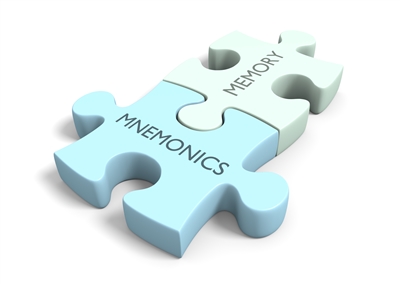The power of mnemonics

Most people will have used Mnemonics as a memory aid at some point in their life. Their power to aid recall by transforming lengthy sentences or long numbers into vivid and interesting mental images has been used for centuries.
The term mnemonic derives from the Greek word `mnēmē,` meaning memory. A simple explanation of mnemonics is that they are a mental tool to help you remember something. The most commonly used type of mnemonic is one that uses expressions or words in its structure. The first letter of each word refer to the piece of information to be remembered. A well known mnemonic, and one that is used by many children as a spelling aid is `Big elephants can`t always use small exits,` with the first letter of the phrase providing the correct spelling for the word `because.`
What`s particularly interesting about mnemonics is that they actually contain more information that the term they encode. The `Big elephants can`t always use small exits,` mnemonic obviously contains more letters and words than `because.` One would think this would negate the usefulness of mnemonics. How could remembering an information-dense term be a wise tactic for recalling an information-light one?
The reason has to do with the way our brains actually store information. Rather than storing isolated details, it seems we are naturally geared to remember a series of events, which we recall as a narrative structure. We could remember in detail the events of the day, and recount them in narrative fashion. We could tell a story that might last five or ten minutes, narrating to life dozens of images and characters and events; but we might well struggle to recall a phone number we were told in the course of the day.
Our memory favours a logical procession of events, where one thing logically leads to another in a narrative fashion. The digits of a phone number are not connected to one another in any way that could be interpreted as a story, which is why they are difficult for people to remember.
The mnemonics just described are often called word, or acrostic mnemonics, but there are many other types of mnemonics. Music mnemonics are extremely useful for remembering information. If one were to consider it, it`s astonishing most adults are able to recall the lyrics for hundreds of songs. On a linguistic level this is an extremely large amount of words.
This astonishing feat of recall is made possible by the words being entwined with the music. Our brains have a natural inclination to understand music - we have to be taught to read before we can understand and appreciate a novel, but we can enjoy music without any training.
It seems our brains are hardwired to respond to rhythm and rhyme, and so this propensity can be exploited by using musical mnemonics. The `ABC Song` which approximately follows the well known Twinkle Twinkle Little Star melody, is still sung by children to help them learn the alphabet.
Method of Loci is another mnemonic device, which exploits spatial relationships in order to aid memorisation. To use this process one must visually imagine a place that is well known, such as a childhood home or bedroom. You them mentally place objects throughout the location to remind you of what needs to be remembered. It is thought this method is so effective as a memory aid because it calls upon our visual and spatial cognition - areas of the brain which are highly developed - and draws power from this regions.

 Add a Comment
Add a Comment